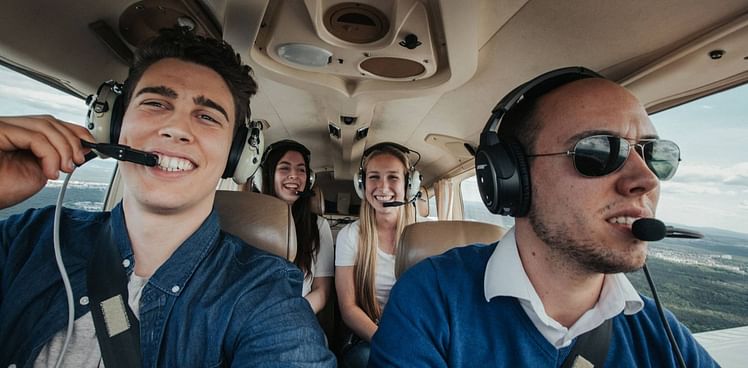
Regulation and EASA Charter
A clear European regulation
Flight sharing is fully legal in the European Union according to the European Regulation (EU) No 965/2012 and it has been confirmed by the EASA itself in this letter. Private pilots are allowed to share their flights and costs with passengers in non-complex aircraft carrying no more than 6 persons including the pilot, and are allowed to advertise these flights. It is illegal for pilots to make any profit, however it is possible for them to share the direct costs of the flight.

Following the EASA Charter
We are proud to have signed a Safety Charter with the EASA. This Charter has been developed in cooperation with the European Aviation Safety Agency in order to promote the safety of non-commercial General Aviation flights in light aircrafts. By signing this Charter, Wingly commits to adhering to its principles, responsibilities and values.
Pilot Checklist for Wingly passenger handling
The European Aviation Safety Agency has built a Pilot Checklist of the necessary steps for pilots to follow when communicating to passengers about safety and logistics. The checklist is of interest to both pilots and passengers as it's aim is to ensure that pilots and passengers can share the flight in the safest conditions possible.
The Civil Aviation Authorities
The CAA is very supportive of Wingly’s activities, helping pilots advertise cost shared flights and promote light aviation. An official validation letter from the CAA addressed to Wingly specifically assures users of its valid legal status. The CAA Order 1188 General Exception E4277, allows cost-sharing in the same way that EASA does.
Wingly Pro flights
Wingly Pro flights are commercial flights offered by Air transport operators that hold an Air Operators Certificate and possibly an Air Transport Licence, or an Approved Training Organisation (ATO) / Designated Training Organisation (DTO).
Code of Conduct
- Always follow the pilot's instructions
- It is important to understand that the pilot is the only decision maker on the aircraft as he/she is the pilot in command. Before departure, the pilot can decide at any time to cancel the flight. During the flight, passengers must abstain from making any comments on the decisions made by the pilot to avoid distracting them from safely piloting the aircraft.
- Pilots will need to adapt to weather conditions
- As part of their pilot licence, private pilots have received training on weather conditions and the consequences of deteriorating weather conditions. Most pilots will only be allowed to fly in visual weather conditions as part of their VFR (Visual Flight Rules) training. Some pilots might have an IFR (Instrument Flight Rules) qualification and are permitted to fly under non-visual weather conditions. At all times, both VFR and IFR pilot's decision on flying, diversion during flight or not flying should be respected. A passenger should never try to persuade a pilot to fly if the pilot has decided otherwise, at the risk of putting the passenger and the pilot in danger.
- Be precise when stating the weight of passengers and luggage
- The light aircraft in which you will be flying is very sensitive to weight variations. The pilot uses the weight that passengers have declared for themselves and their luggage to check the plane’s centre of gravity. Therefore, it is mandatory that passengers respect the maximum weight authorised by the pilot for the aircraft and refrain from moving their luggage during the flight. It’s for all those reasons that passengers shall indicate the weight precisely before departure and inform the pilot if it were to change.
- Do not bring illegal or dangerous goods on board
- Passengers should never take illegal or risky goods with them. If the passenger has doubts about the dangerous nature of carried goods, the passengers shall inform the pilot and check with the pilot if transportation is possible. The pilot can check your bags at any time and refuse to take you. If the pilot sees that you are carrying dangerous goods and the pilot has not been informed, the pilot shall refuse to take you on board.
- Arrive on time
- When planning the flight, the pilot takes into account the planned time of departure and arrival and the expected weather conditions at those times. Thus it is important that the pilot is able to take-off at the planned time. In case of uncertainty on the timely arrival, passengers shall inform the pilot.
- Cancellation by the passenger before the flight
- The passenger may cancel a flight 24 hours before departure. If there is a cancellation the passenger receives a gift card with the payment amount.
- The safety rules you shall follow carefully
-
Passengers shall obey the following basic safety principles:
- Smoking is prohibited on all flights.
- Passengers are never allowed to touch the instruments as this it could lead to an accident.
- Passengers shall not speak when the pilot is using the radio and during take-off and landing.
- Passengers shall never touch the door lock if the pilot has not instructed them to do so.
- Passengers should refrain from using psychoactive substances, including alcohol before or during flying.
- Passenger shall be aware that there will be no toilets onboard.